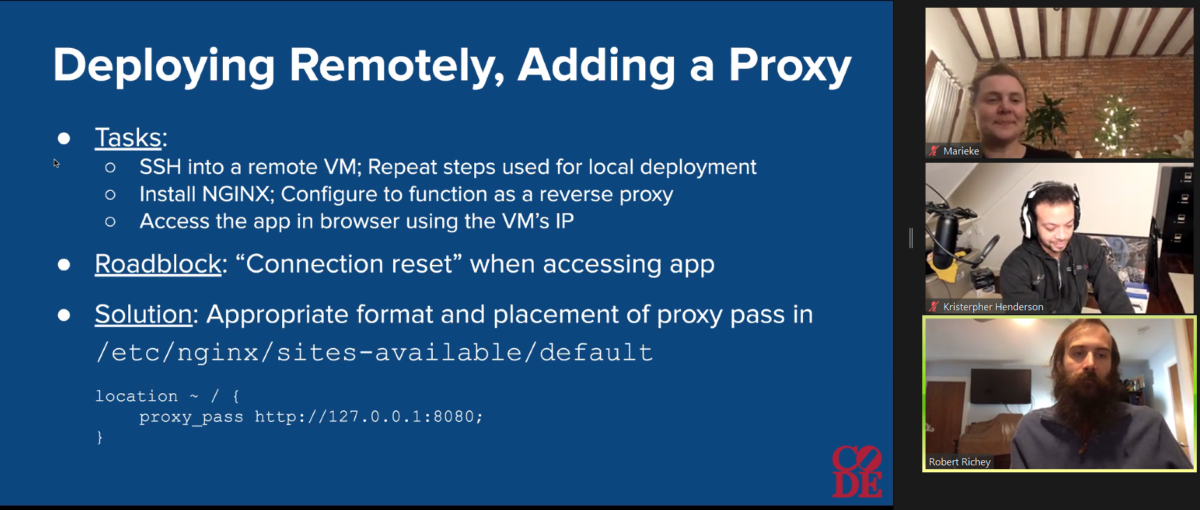Mentorship and skills training are two levers by which aspiring technologists can launch their careers. Volunteer-run civic hacking group Code For Philly’s new fellowship program offered both, with a focus on reducing barriers for those underrepresented in the industry.
The Comcast-funded program commenced with a presentation Wednesday evening from the members of its first cohort. Each of the three fellows — Ioannis Sporidis-Foster, Sara Gormley and Robert Richey, who beat out around 100 other applicants — received a $1,500 stipend over eight weeks for project-based work, as well as mentorship from local pros.
Code For Philly Co-Director Marieke Jackson said the fellowship aimed to boost the fellows’ entry into the tech industry. Fellows were expected to work on their project 10 hours each week, and a willingness to learn and a high capacity for collaboration were essential.
Front-end developer Mikey Manoguerra, production engineer Kristerpher Henderson and product manger Brittany Anderson joined Jackson in mentoring the three fellows. Senior adviser Rich McMillen and career development lead Pam Selle also offered support.
In addition to developing tech skills, each fellow received support in job searching and collaboration. Here’s what the fellows worked on, and what they said they got out of the program:
Confidence boost
Sporidis-Foster, an elementary school teacher, developed his coding skills with Manoguerra’s help and said he participated in the Code For Philly fellowship as a way to break into the tech industry. A native of Greece, Sporidis-Foster has lived in the U.S. for a decade and felt like he had reached a plateau in his current career.
For his project, Sporidis-Foster designed an app for Prevention Point, a North Philadelphia nonprofit that specializes in safe needle exchange. The app’s purpose is to store data about participants in the program and consisted of an administration page and a data management page. The app functions using Python, React.js, Material-UI and Docker. Sporidis-Foster worked on the front end of the data management section with React.js.
Before the fellowship, Sporidis-Foster participated in a coding bootcamp at the University of Pennsylvania but still had reservations about his abilities as a technologist. Increasing his confidence as a developer was one of the biggest outcomes of his fellowship, he said.
“Starting this journey I had a lot of doubts,” he said. “One of the main things to take away is that I have to believe in myself as a developer. No one can be perfect in anything, especially in a field like tech that is so vast.”
While still in the midst of the program, Sporidis-Foster also told Technical.ly that he’d like to work at a company that offers a similar mentorship program so he could continue to improve his skills.
“But sometime in the future, when I feel a bit more ready and established, I would like to start my own agency, offering my services in a remote setting,” he said.
Git skills
Gormley is a data analyst via AmeriCorps and spent her fellowship working with Anderson and Jackson on developing her project management skills. Another Penn graduate, Gormley has a background in organizational psychology and found there to be a significant lack of tech literacy in the community.
Using Git, Gormley worked closely with Anderson on a project for Philadelphia Bail Fund. The goal of the project was to scrape new criminal filings daily for new cases and dockets that have more information on bail. Using that information, Gormley could extract data and paint a larger picture of what bail looks like in Philadelphia.
“I have never worked with Git before and am using it now,” she said. “It was really valuable to be able to see a viable choice for me to move into and that I think I could perform well in.”
Peer support
Warminster native Richey worked with Henderson on DevOps, a combination of software development and IT operations. As a person that uses a wheelchair, Richey shared that he has a love-hate relationship with assistive technology. He is grateful for the advances in technology that allow him to do things like code via dictation but he believes that it still has a long way to go to being truly accessible.
While Richey has a masters degree in computer science, he said that learning about DevOps was a different experience. Using Docker, his project’s goal was to help an app deploy remotely. Richey worked through a Kubernetes basic online tutorial, deployed the app locally using minikube and then repeated those on a cluster hosted by Linode.
Richey ran into an issue when the app services didn’t communicate with one another using minikube. Being able to work through solutions with Henderson made learning easier and for an overall more enjoyable experience, he said.
Jackson said Code for Philly plans to include a fourth fellow on a project starting mid-January, but isn’t sure yet if it will host future fellowships.
Michael Butler is a 2020-2022 corps member for Report for America, an initiative of The Groundtruth Project that pairs young journalists with local newsrooms. This position is supported by the Lenfest Institute for Journalism.Join our growing Slack community
Join 5,000 tech professionals and entrepreneurs in our community Slack today!
Donate to the Journalism Fund
Your support powers our independent journalism. Unlike most business-media outlets, we don’t have a paywall. Instead, we count on your personal and organizational contributions.

National AI safety group and CHIPS for America at risk with latest Trump administration firings

Immigration-focused AI chatbot wins $2,500 from Temple University to go from idea to action

The good news hiding in Philly’s 2024 venture capital slowdown


